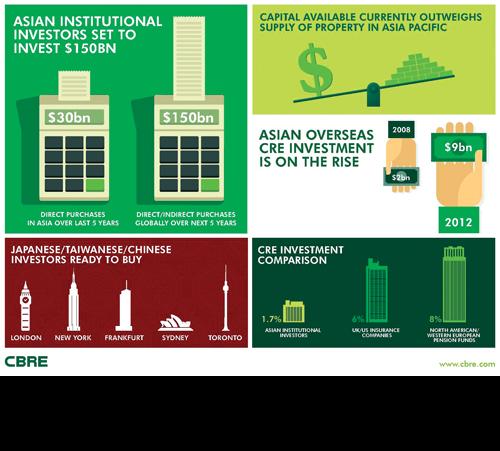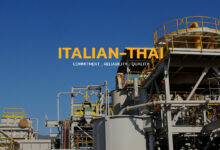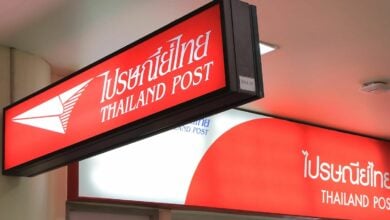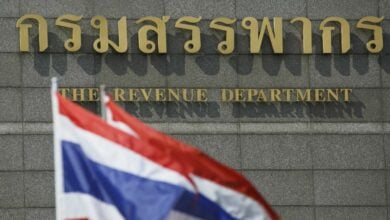Asian groups may invest US$150bn in markets abroad

PHUKET: Institutional investors based in Asia could look to invest in excess of US$150 billion in global real estate over the next five years, though not necessarily in domestic markets.
According to the latest research from leading global real estate services provider, CBRE, since there is limited investable stock available in Asia, such investors – including banks, insurance companies as well as organizations managing various types of pooled funds – will likely seek opportunities outside of Asia – in London, New York, Sydney and other gateway cities.
Cash-rich Asian institutional investors currently control a fifth of global institutional capital; however, the current low global interest rate environment and weak stock market performance means they face significant challenges in maintaining adequate returns on their investments.
Many of these investors have begun to recognize the benefits of adding real estate assets to their portfolios, but despite a sharp increase in investment activity in recent years, presently allocate just 1.7% of their assets to real estate, compared to 6-8% among institutional investors in North America and Europe.
The lack of overseas investment experience, regulatory restrictions, limited investable stock and aggressive pricing have posed significant challenges for investors seeking to expand their portfolios within the Asian Pacific region.
This has prompted Asian institutional investors to seek opportunities overseas, with core assets in gateway cities the most sought after asset class. Acquisitions by Asian investors outside the region surged from US$2 billion in 2008 to almost US$9 billion in 2012, with Asian institutions accounting for a large portion of the purchases. Europe is currently the major focus for Asian investors followed by North America and Australia.
As Asian institutional investors diversify into low-risk alternative asset classes, more are expected to increase their allocation to real estate.
A conservative estimate of increasing their allocation to real estate to 2.5-3.5% in the next five years – allowing for a steady increase of asset size at 4-6% per annum – would translate into a potential inflow in excess of US$150 billion (including direct and indirect real estate investment) into the global real estate investment market.
The large volume of prime commercial property currently in the development pipeline in Asia Pacific will partly alleviate this pressure; however, this new stock will still be insufficient to meet the demand of the large volume of institutional capital earmarked to be invested in real estate. In addition, other investors such as Real Estate Investment Trusts (REITs) and end-users will also be competing to acquire new properties, a situation which may result in a prolonged period of structurally low yields for core assets in Asia.
Chris Ludeman, President, Global Capital Markets, CBRE, commented: “Asian institutional investors are already beginning to acquire assets overseas, with core assets in gateway cities being the most sought after asset class. Given the numerous challenges they face domestically, most groups are likely to target other major markets,
particularly in Europe and North America,” he continues.
“While investors that have already had exposure in global markets will continue to acquire new assets, the next few years will see a number of new entrants to leading global real estate markets such as London and New York. Japanese institutions, which to date have largely been absent from the global scene, as well as Taiwanese and Chinese insurance companies will be the first groups to emerge.”
The past year has seen several markets make progress towards liberalizing outbound investment in the insurance sector. In October 2012 the Chinese Insurance Regulatory Commission (CIRC) relaxed its restrictions on overseas investment by domestic insurance companies. Chinese insurers are now permitted to invest in completed commercial properties in the gateway cities of 45 designated countries. In Taiwan, discussions about permitting domestic insurance companies to invest in real estate offshore are ongoing.
Marc Giuffrida, Executive Director, Global Capital Markets, CBRE, commented: “We are seeing an acceleration in enquiry levels and deals closed in just about every global gateway market. We initially advised a handful of the larger pension and sovereign funds, and now these first-movers have started harvesting their 2009 vintage assets.
The market has seen how successful they have been in both protecting capital and exceeding their investment hurdle rates. These positive results provide tangible evidence and confidence for the more cautious or skeptical that global real estate can add value and most importantly is accessible.”
Keep checking the Phuket Gazette’s business pages, join our Facebook fan page or follow us on Twitter @PhuketGazette for the latest local and national business updates.
Join the conversation and have your say on Thailand news published on The Thaiger.
Thaiger Talk is our new Thaiger Community where you can join the discussion on everything happening in Thailand right now.
Please note that articles are not posted to the forum instantly and can take up to 20 min before being visible. Click for more information and the Thaiger Talk Guidelines.
Leave a Reply
You must be logged in to post a comment.







